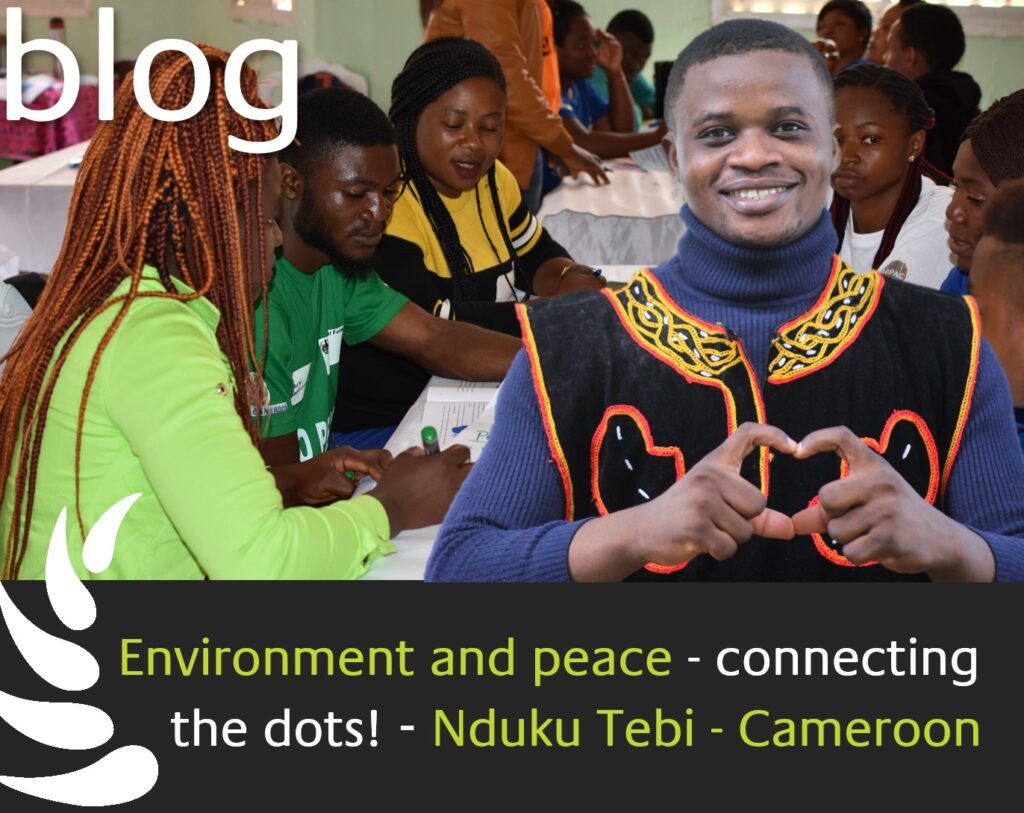Summary
It is easy to radicalize young people into taking up arms and starting a war, but it is challenging to put an end to structural violence.
Nduku's childhood dream was to become a lecturer. But in 2017, a civil war broke out in Cameroon. He was kidnapped on his way to university and tortured by rebels for two weeks. After trauma healing, he became a teacher in several places in the far North, in Sub-Saharan Cameroon. There he experienced poverty, hunger, water scarcity, religious intolerance, and terror attacks by Boko Haram. Connecting the dots, Nduku understood the strong link between climate change and civil war. And thus, he started Xhuma Africa, a peace academy that empowers African youth to change their local communities into peaceful and environmentally healthy surroundings.
By Nduku Louis Tebi
It was Monday, the 16th of July 2018, I got up early to prepare for my examination and by 6:30 am, I was walking to the University of Bamenda when several young men pointed guns at me. They blindfolded me, placed me on a motorbike, and raced off to a camp in the forest. The rebels accused me of going to school and that’s why they kidnapped me. That was my only ‘crime’.
Born in an average African home, I am one of ten siblings. When I was little, my father, a veterinary doctor, gifted me three pets, a rabbit, a dog, and a pig. Feeding and caring for these animals gave me a sense of what it means to share, love, and take up responsibility for the well-being of others.
Back then, my dream was to become a university lecturer. Sharing knowledge, transforming lives, and connecting learners from around the world was my goal.
When I was 11 years old, my father died. Six of my brothers dropped out of school due to limited financial means, but my passion for education grew even stronger. Family friends sponsored me from school to college. Upon admission into the university, I felt my childhood dream would soon come true.
But in January 2017, a civil war broke out in Anglophone Cameroon. A peaceful protest by teachers and lawyers escalated into a separatist armed conflict with activists fighting for a breakout state they call “Ambazonia”.
Government troops were deployed to our region to maintain law and order. The North-West governor signed a release prohibiting movement after 7:00 pm. In retaliation, separatist leaders used social media like Facebook and WhatsApp to impose a ghost town, a lockdown, and a school boycott for all.
The internet was shut down by the government for 93 days to prevent the spread of fake news and calls for killings. Parents were asked by rebels to keep their children safe at home while they engaged the regular military in gun battles. Despite the obvious dangers of showing disobedience towards the separatists, faculty officers invited final-year students to come for their examinations. My fear of having to repeat the same class convinced me to resume school, so I defied the danger.
What happened on that Monday morning changed my life forever. The rebels brought me and two other students to a compound far out in the forest. At the entrance to this camp, I saw sticks, decorated with freshly cut human heads. In the camp lived a woman whom the rebels respectfully called their “Queen mother”, a spiritual leader who created charms for the rebels. She cooked food for us and she decided which of us should be executed.
My phone was seized, and my hands and legs were chained by a young boy. I was beaten and under constant threat to be killed when French-speaking friends called my phone. Two weeks later, I was very lucky, because my family managed to pay a ransom and I was released.
During my stay in the camp, I had developed plans to one day take revenge against my abductors. And then, days after I was released, I heard that the military raided the same rebel camp, and all my kidnappers were killed. To my surprise, this news didn’t satisfy me at all. Although I was not involved in giving the coordinates to the military, the killings made me feel guilty, just for my thoughts of revenge.
Being traumatized, I went through therapy and attended peace-building training. In 2019, I became a teacher at Government Technical College, Figuil. The school is situated in the Sahara Desert in the Northern Region of Cameroon. There is a lack of food and lack of access to water. There are hardly any trees and thus, we experienced extreme temperatures of 45 degrees followed by thunderstorms and floods. People suffer from diseases like malaria, malnutrition, cholera, and typhoid. And all this was overshadowed by the violence of attacks by Bokoharam.
Here I understood the connection between climate change and war. On one hand, hunger, droughts, and floods cause poverty, and poverty is the cause of fights over resources. On the other hand, religious intolerance, political power, and ethnic crises nurture the battles of our century.
To put an end to the continuous violence, we, the youth of Africa, are in need to get a deeper understanding of the problem and develop our own methodologies of conflict resolution. Peace can only be sustainable if we connect the dots and unite for peace and the protection of our environment.




I am pleased to have gone through this incredible piece of art and dream. Your leadership yearning and passion is an honor to the people of Africa and Cameroon in particular.
I need not to say much, rather wish you a spiritual momentum as you continue in the part of peace and conflict resolution to enlighten the darkness of humanity.
May your light keeps shining